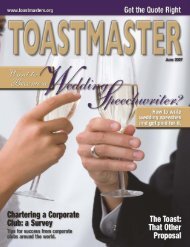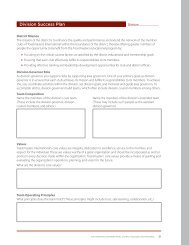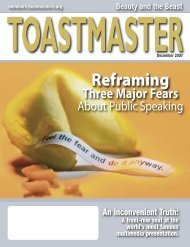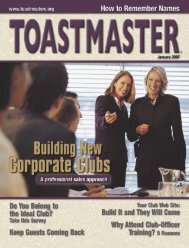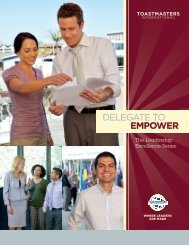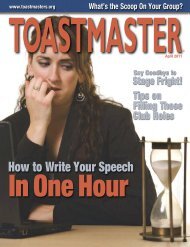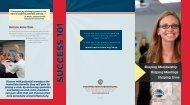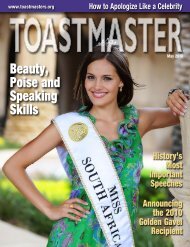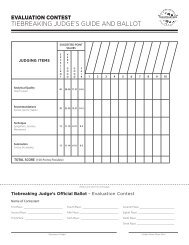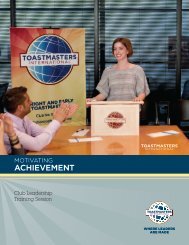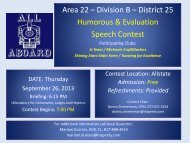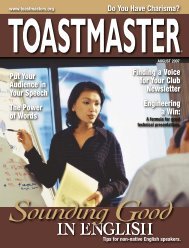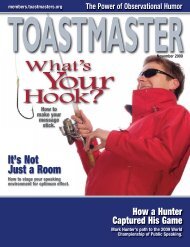September 2011 - District 25 Toastmasters
September 2011 - District 25 Toastmasters
September 2011 - District 25 Toastmasters
You also want an ePaper? Increase the reach of your titles
YUMPU automatically turns print PDFs into web optimized ePapers that Google loves.
HOW TO BENEFIT<br />
FROM CHANGE<br />
Don’t let roadblocks distract you from your goals.<br />
By Dana LaMon, DTM, AS<br />
No matter who you were<br />
yesterday, today you are a<br />
different person. You are different<br />
because your circumstances are<br />
different. And circumstances constantly<br />
change. As the Greek philosopher<br />
Hericlitus wrote in 500 B.C.: “Nothing<br />
is permanent but change.”<br />
The idea of change is not news.<br />
What may be news is that with every<br />
moment of change comes the opportunity<br />
for the best that life has to<br />
I was a boy.” On one occasion he<br />
recounted how his own PE teacher<br />
made him run track in the snow. His<br />
story followed our complaint that he<br />
was making us run in the rain.<br />
You cannot benefit from change if<br />
you meet it with resistance, reluctance<br />
or regret. A better attitude is the only<br />
sure way to personal growth. Welcome<br />
change, because it’s inevitable.<br />
When it comes, the good news is that<br />
it will bring another opportunity for<br />
“The force of change that might push you<br />
in a direction not of your liking can be<br />
matched by the force of will that is in the<br />
essence of your being.”<br />
offer. The question is, Do you have<br />
the capacity to maximize the benefit<br />
from change Your capacity to do<br />
so can be measured by six gauges:<br />
Attitude, Desire, Vision, In-nergy,<br />
Control and Excellence.<br />
Attitude. Whether or not you can<br />
benefit from change depends on your<br />
attitude, which is the perspective from<br />
which you approach an endeavor.<br />
The common response to change is<br />
resistance. We resist change because of<br />
our fear of the unknown or our desire<br />
to remain in our comfort zone. Often<br />
we look back nostalgically and see the<br />
past as a brighter time.<br />
My junior high school physical<br />
education (PE) teacher, Mr. Leonard,<br />
frequently employed the phrase “when<br />
you to develop into the individual you<br />
were created to be.<br />
Desire. To know how to handle opportunity<br />
when it rides on a wave of<br />
change, you have to know what you<br />
want. Should I say “yes” to the opportunity<br />
Should I invest now Should<br />
I relocate You cannot confidently<br />
answer these kinds of questions if you<br />
are uncertain about what you want.<br />
After I passed the California bar<br />
in 1978, an attorney who was also an<br />
accountant offered me the opportunity<br />
to join him in a tax business. He<br />
wanted to do the accounting aspect<br />
and wanted me to handle the legal<br />
matters. He was direct about how he<br />
did not want to be involved in the law<br />
at all. I rejected the offer, because at<br />
the time I needed and wanted expert<br />
training as a new lawyer. I wasn’t going<br />
to get it from him.<br />
Take a moment to consider what<br />
you want, and write it down. For the<br />
greatest benefit, your list should be of<br />
what you want to do as opposed to<br />
what you want to be. Such an action<br />
list will provide guidelines for what to<br />
do when you approach change.<br />
Vision. It is possible that changed<br />
circumstances place a major roadblock<br />
in your present path. To develop<br />
an alternate route, you need to have<br />
a vision of where you want to be and<br />
the best ways to get there. Change<br />
may dictate that you redraw the map<br />
you had plotted out in order to find<br />
another route to your goal. Don’t be<br />
afraid to review the big picture from<br />
time to time to see how change might<br />
enhance your focus. Then use your<br />
new knowledge to rethink your plans.<br />
Though I became blind at the age<br />
of four, I did not learn to use a cane<br />
for mobility until I was 16. When I use<br />
my cane to walk around on my own, I<br />
don’t count steps; I hold a mental picture<br />
of me walking the path to where<br />
I’m going. It’s a good thing I don’t rely<br />
on counting steps because invariably<br />
someone will come up alongside me<br />
and ask if I’m counting my steps. If I<br />
were, I’d certainly lose my count to<br />
answer the question!<br />
Keeping a vision of where you<br />
want to go, and knowing all the ways<br />
you might get there, will ensure that<br />
TOASTMASTER SEPTEMBER <strong>2011</strong><br />
17



